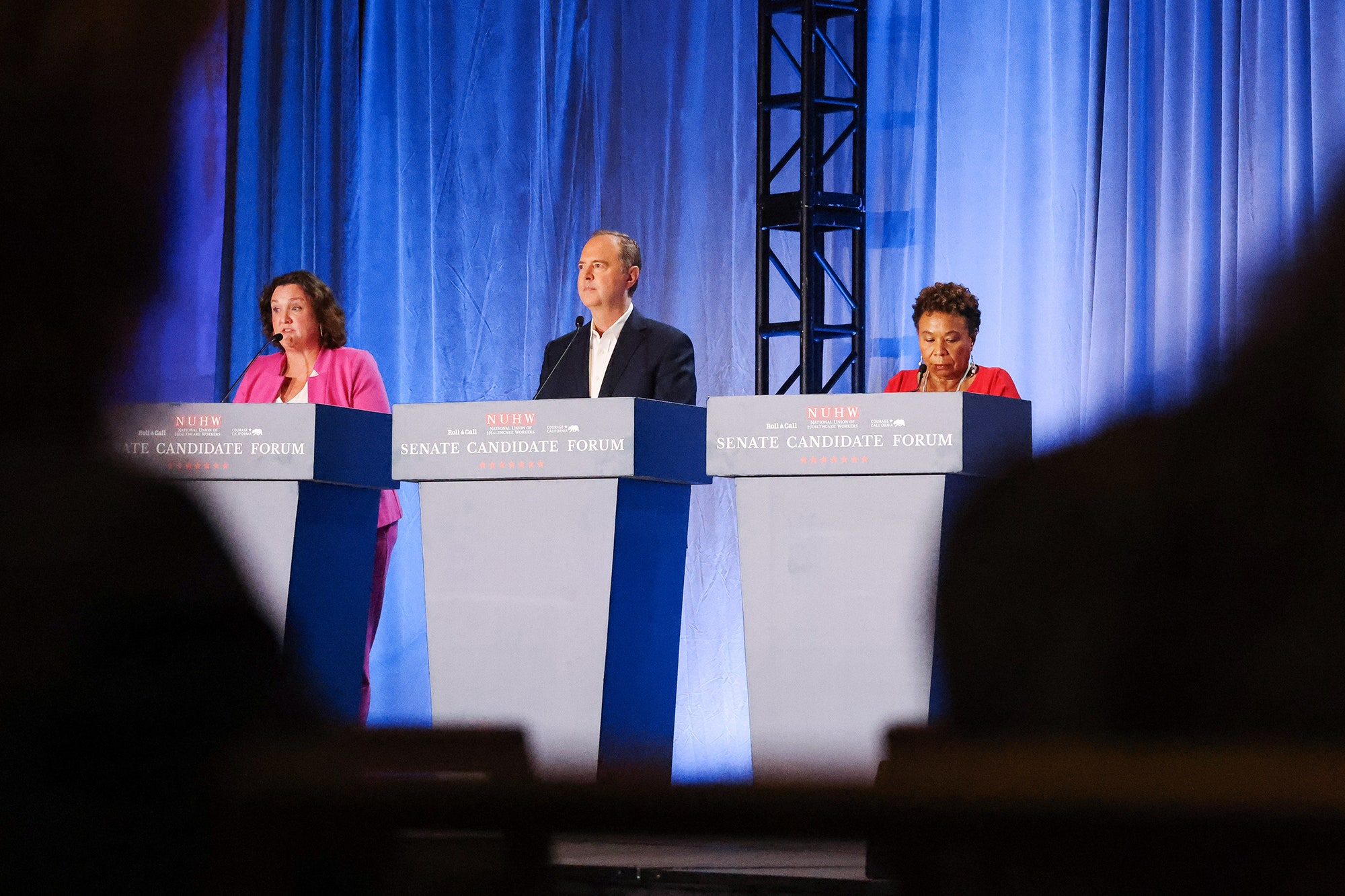The article's title could be rewritten as: "California's US Senate Race Sparks Controversy Among Democrats: A Closer Look"

Written by Chris Smith
Adam Schiff is a Los Angeles Dodgers supporter while Katie Porter backs the Angels. However, their current heated disagreement is not about baseball, but about Steve Garvey, a former Dodgers' first baseman. The disagreement arises from Democrat Schiff's advertisements attacking Garvey and inadvertently creating prominence for the Republican candidate. This tactic might benefit Schiff in his primary race against fellow Democrats Porter and Barbara Lee in his bid to become California's next US senator. Porter opines this strategy is intentionally aimed at removing competitive progressive female Democrats from the race. However, Schiff believes some Democrats opt to pull down their peers to rise, a sentiment he does not share. He explains that Garvey has been attacking him on Fox News exclusively and not the other Democrats, hence, he plans to fight back.
This strategic play and subsequent in-fighting are a product of California's "jungle" primary system where candidates from all parties compete in one ballot and the top two candidates proceed to the general elections. Porter, believing that Schiff is afraid of facing her in a one-on-one race, claims Schiff is resorting to the cynical tactic of promoting Garvey to encourage Republican primary turnout. If Garvey finishes second in the primaries, Schiff will have a weaker opponent in the final November election. Schiff dismisses the idea, adding he will run a race that is designed to be victorious.
This political tension has intensified in the last few days leading to the primary on March 5. Still, the race to replace the late senator Dianne Feinstein remains intriguing. The top contenders like Schiff and Porter are charismatic and well-experienced in politics.
Among the Democrats, Schiff, 63, has leveraged his media fame and influential patrons for consistent leads in funding and polls. He gained national recognition in 2020 when he served as the lead House manager in Donald Trump's inaugural Senate impeachment trial. Porter, 50, has earned some national fame as a straight-talking, whiteboard-wielding Congresswoman. Lastly, Lee, 77, although lesser-known beyond her constituency in Oakland, is known for her progressive politics and as the only Congress member who voted against the Afghanistan war following the September 11 attacks.
The Democrats with the best odds of advancing to the general elections are Schiff and Porter. Schiff considers himself a moderate with strong Democratic establishment ties. Porter, on the other hand, is keen on overturning the status quo. She views the race as a battle against a Washington dominated by corporations and corporate PAC spending, against a Washington that is focused on creating opportunities and economic prosperity for Californian families.
Then there’s the Republican, Garvey. The 75-year-old first-time candidate hasn’t raised much money and has performed poorly in two debates; he has also been featured in a Los Angeles Times story in which three of Garvey’s children said he has ignored them for years. (Garvey’s campaign did not respond to the Times’ questions about his children.) Yet Garvey’s 19-year big-league career has given him durable name recognition, and he has lately been neck and neck with Porter in the polls for second place in the primary.
That Schiff’s team would seize on Garvey’s standing to try to squeeze out Porter comes as no surprise to veteran California strategists—trying to choose your opponent in the state has a history of being effective. “This is a 20-year-plus campaign tactic that lazy consultants go to when they have nothing better to do,” says Mike Trujillo, a California Democratic consultant who is not working for any of the current Senate candidates and is only half-joking about the “lazy” part. “It worked for Gavin Newsom in 2018, when he wanted to edge out Antonio Villaraigosa and run against John Cox, a Republican. It worked for Gray Davis in 2002, when he wanted to edge out Richard Riordan, and he got Bill Simon as his opponent.” Garvey’s spokesman has called Schiff’s ad “divisive rhetoric that aims to separate us.”
Porter knows California’s electoral history, of course, which is one reason she’s strenuously calling out Schiff’s use of Garvey as she tries to gain a head-to-head matchup with her fellow Democrat in the fall. “I have shown over and over again in Orange County that I have the ability to win persuadable Republicans and engage independents,” Porter says. “And that is all really, really potent in a general election where you have higher turnout and a more diverse turnout.”
Schiff, steeled by a history of fending off insults from Trump, is unlikely to flinch. “The first time he attacked me on Twitter to his tens of millions of followers—‘Sleazy Adam Schiff, blah, blah, blah’—I was walking on the House floor, desperate to figure out what to do,” Schiff says. “And Mike Thompson, my old roommate from Sacramento, grabbed my arm and said, ‘Adam, you should reply, “Mr. President, when they go low, we go high. Go fuck yourself.”’ If I ever write a coffee-table book on the tweets that I wish I had sent, that will be on the cover.”




